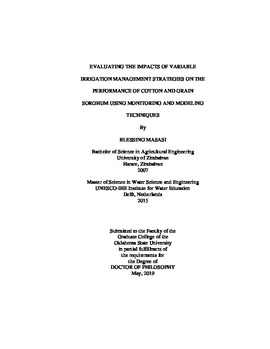| dc.contributor.advisor | Taghvaeian, Saleh | |
| dc.contributor.author | Masasi, Blessing | |
| dc.date.accessioned | 2019-10-25T19:51:36Z | |
| dc.date.available | 2019-10-25T19:51:36Z | |
| dc.date.issued | 2019-05-01 | |
| dc.identifier.uri | https://hdl.handle.net/11244/321551 | |
| dc.description.abstract | Diminishing water resources have threatened irrigated agriculture in many semi-arid and arid regions across the globe. In these regions, both surface and groundwater resources have declined due to persistent droughts and severe groundwater abstractions. Resultantly, producers are finding it difficult to irrigate to meet full crop water needs. Hence, there is an immediate need to find irrigation management strategies that ensure efficient utilization and conservation of water resources while optimizing crop yields in these areas. To achieve these goals, monitoring tools and crop models can be used to evaluate various irrigation management scenarios, so that meaningful irrigation recommendations could be offered to producers. The main goal of this research was to investigate crop and irrigation management practices for improving water conservation in the southern Great Plains, using a combination of field monitoring and crop modeling techniques. The specific objectives were: (1) To investigate the impacts of irrigation termination date on cotton yield and irrigation requirement, (2) To calibrate and validate a crop model for cotton and to apply the model to study the impact of irrigation capacity and seasonal weather conditions on cotton performance, and (3) To calibrate and validate a crop model for variably irrigated grain sorghum and apply the model to evaluate the performance of key water management scenarios. Evaluation of the effects of irrigation termination revealed that early irrigation terminations of cotton resulted in significant reductions in irrigation requirement, but this water conservation caused considerable declines in cotton yield. The performance of the crop model showed that it could be used as an effective tool for evaluating the impacts of variable crop and irrigation managements on the production of cotton and grain sorghum in the southern Great Plains. In both modeling studies, the results revealed a significant impact of planting date on crop yield and irrigation requirements, and this information gives the producers an opportunity to carefully consider this variable to optimize irrigation utilization. Additionally, simulations revealed that equally high cotton yields could be obtained with low irrigation capacities in the Southern High Plains region and this presents an opportunity to prolong the life of the Ogallala aquifer. | |
| dc.format | application/pdf | |
| dc.language | en_US | |
| dc.rights | Copyright is held by the author who has granted the Oklahoma State University Library the non-exclusive right to share this material in its institutional repository. Contact Digital Library Services at lib-dls@okstate.edu or 405-744-9161 for the permission policy on the use, reproduction or distribution of this material. | |
| dc.title | Evaluating the Impacts of Variable Irrigation Management Strategies on the Performance of Cotton and Grain Sorghum Using Monitoring and Modeling Techniques | |
| dc.contributor.committeeMember | Frazier, Robert Scott | |
| dc.contributor.committeeMember | Gowda, Prasanna H. | |
| dc.contributor.committeeMember | Warren, Jason G. | |
| osu.filename | Masasi_okstate_0664D_16287.pdf | |
| osu.accesstype | Open Access | |
| dc.type.genre | Dissertation | |
| dc.type.material | Text | |
| dc.subject.keywords | aquacrop | |
| dc.subject.keywords | irrigation | |
| dc.subject.keywords | irrigation capacity | |
| dc.subject.keywords | irrigation termination | |
| dc.subject.keywords | modeling | |
| dc.subject.keywords | water conservation | |
| thesis.degree.discipline | Biosystems and Agricultural Engineering | |
| thesis.degree.grantor | Oklahoma State University | |
